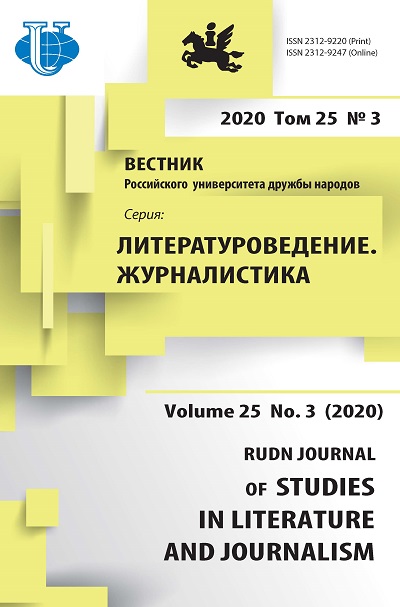Связи с общественностью в контексте медиатизации: формирование концептуальной рамки исследования
- Авторы: Шилина М.Г.1
-
Учреждения:
- Российский экономический университет имени Г.В. Плеханова
- Выпуск: Том 25, № 3 (2020)
- Страницы: 521-530
- Раздел: Журналистика
- URL: https://journals.rudn.ru/literary-criticism/article/view/24828
- DOI: https://doi.org/10.22363/2312-9220-2020-25-3-521-530
- ID: 24828
Цитировать
Полный текст
Аннотация
В статье впервые в отечественном научном дискурсе о связях с общественностью (СО) предпринята попытка анализа СО в контексте актуальных базовых концепций медиатизации в условиях цифровой датификации. Компаративный анализ концептуальных параметров данных феноменов позволяет предложить в итоге более релевантный исследовательский подход, концептуальные рамки и инструментарий изучения связей с общественностью в условиях медиатизации. В исследованиях медиатизации, в свою очередь, представляется значимым применение инструментария СО, например субъектно-объектной парадигмы исследования для выявления базисных субъектов (заказчиков коммуникации) с целью более эффективного определения параметров коммуникативной фигурации. Выявлено, что практики и концептуальные рамки медиатизации и связей с общественностью трансформируются в парадигме новейшей «глубокой медиатизации», что провоцирует концептуальное сближение медиатизации и связей с общественностью.
Об авторах
Марина Григорьевна Шилина
Российский экономический университет имени Г.В. Плеханова
Автор, ответственный за переписку.
Email: SHilina.MG@rea.ru
доктор филологических наук, профессор кафедры рекламы, связей с общественностью и дизайна факультета маркетинга
Российская Федерация, 115093, Москва, Стремянный пер., 36Список литературы
- Krotz F. Mediatization: a concept with which to grasp media and societal change // Mediatization: Concept, Changes, Consequences / ed by K. Lundby. New York: Peter Lang, 2009. URL: https://johnpostill.com/2010/03/01/notes-on-krotz-2009-mediatization/ (дата обращения 20.06.2020).
- Шаронов Д.И. О коммуникативном смысле медиатизации // Вестник ВГУ. Серия: Филология. Журналистика. 2008. № 2. С. 234-239. URL: http://www.vestnik.vsu.ru/ pdf/phylolog/2008/02/2008_02_46.pdf (дата обращения: 27.06.2020).
- Hepp A. Deep mediatization. London: Routledge, 2020.
- Hepp A., Hasebrink U. Human interaction and communicative figurations. The transformation of mediatized cultures and societies // Mediatization of Communication / ed. by K. Lundby. Berlin: De Gruyter Mouton, 2014. Pp. 249-271.
- Couldry N., Hepp A. Mediated Construction of Reality. London: Wiley, 2017.
- Ampuja M., Koivisto J., Väliverronen E. Strong and weak forms of mediatization theory: a critical review // Nordicom Review. 2014. Vol. 35. Pp. 11-123.
- Hepp A., Hjarvard S., Lundby K. Mediatization: theorizing the interplay between media, culture and society // Media, Culture & Society. 2015. Vol. 37. No. 2. Pp. 314-324. doi: 10.1177/0163443715573835.
- Кривоносов А.Д., Филатова О.Г., Шишкина М.А. Основы теории связей с общественностью. СПб.: Питер, 2018.
- Hepp A., Krotz F. Mediatized worlds - understanding everyday mediatization // Mediatized Worlds. Culture and Society in a Media Age. Basingstoke: Palgrave Macmillan, 2014. Pp. 1-14.
- Krotz F. Media, mediatization and mediatized worlds: a discussion of the basic concepts // Mediatized Worlds. Culture and Society in a Media Age. Basingtoke: Palgrave Macmillan, 2014. Pp. 72-87. doi: 10.1057/9781137300355_5.
- Hepp A. Cultures of Mediatization. Cambridge: Polity, 2013.
- Андрианова Т.В., Ракитов А.И. Современные тенденции информатизации и медиатизации общества: науч.-аналит. обзор. М.: ИНИОН, 1991.
- Вартанова Е.Л. Медиасистема России: учеб. пособие для студентов вузов. М.: Аспект Пресс, 2017.
- Землянова Л.М. Сетевое общество, информационализм и виртуальная культура // Вестн. Моск. ун-та. Сер. 10. Журналистика. 1999. № 2. С. 58-69.
- Гуреева А.Н. Теоретическое понимание медиатизации в условиях цифровой среды // Вестн. Моск. ун-та. Сер. 10. Журналистика. 2016. № 1. С. 192-208.
- Гуреева А.Н. Междисциплинарность теоретических концепций в российских и зарубежных исследованиях процесса медиатизации // Медиаскоп. 2017. Вып. 4. URL: http://www.mediascope.ru/2388 (дата обращения: 26.06.2020).
- Ним Е.Г. Исследуя медиатизацию общества: концепт медиатизированных миров // Социологический журнал. 2017. Т. 23. № 3. С. 8-25. doi: 10.19181/socjour.2017. 23.3.5361.
- Wiesenberg M., Tench R. Deep Strategic Mediatization: Organizational Leaders’ Knowledge and Usage of Social Bots in an Era of Disinformation // International Journal of Information Management. 2019. doi: 10.1016/j.ijinfomgt.2019.102042.
- Шишкина М.А. Паблик рилейшнз в системе социального управления. СПб., 2002.
- Thompson J.B. The Media and Modernity. A Social Theory of the Media. Cambridge: Polity, 1995.
- Schultz W. Reconstructing mediatization as an analytical concept // European Journal of Communication. 2004. Vol. 19. No. 1. Pp. 87-101.
- Mediatization of Communication. Handbooks of Communication Science / ed. by K. Lundby. Berlin: De Gruyter Mouton, 2014.
- Krotz F. From a social worlds perspective to the analysis of mediatized worlds // Media Practice and Everyday Agency in Europe / ed. by L. Kramp, N. Carpentier, A. Hepp et al. Bremen: Edition Lumière, 2014. Pp. 83-99.
- Элиас Н. Избранные произведения / cост., общ. ред. и послесл. Ю.Н. Давыдова; предисл. П.П. Гайденко. М.: Прогресс, 1990.
- Hepp А. Communicative figurations: researching cultures of mediatization // Media Practice and Everyday Agency in Europe // ed. by L. Kramp, N. Carpentier, A. Hepp et al. Bremen: Edition Lumière, 2014.
- Буари Ф. Паблик рилейшнз, или Стратегия доверия. М.: Инфра-М, 2001.
- Писарский И. Создавая ткань общественной связанности // МедиаТренды. 2020, 26 июня. № 3 (75). С. 2. URL: http://www.journ.msu.ru/downloads/2020/MediaTrendi_75.pdf (дата обращения: 28.06.2020).
- «Серебряный Лучник»: открывая новые компетенции / под ред. Н. Явдолюк // МедиаТренды. 2020, 26 июня. № 3 (75). С. 5. URL: http://www.journ.msu.ru/downloads/ 2020/MediaTrendi_75.pdf (дата обращения: 28.06.2020).
Дополнительные файлы















